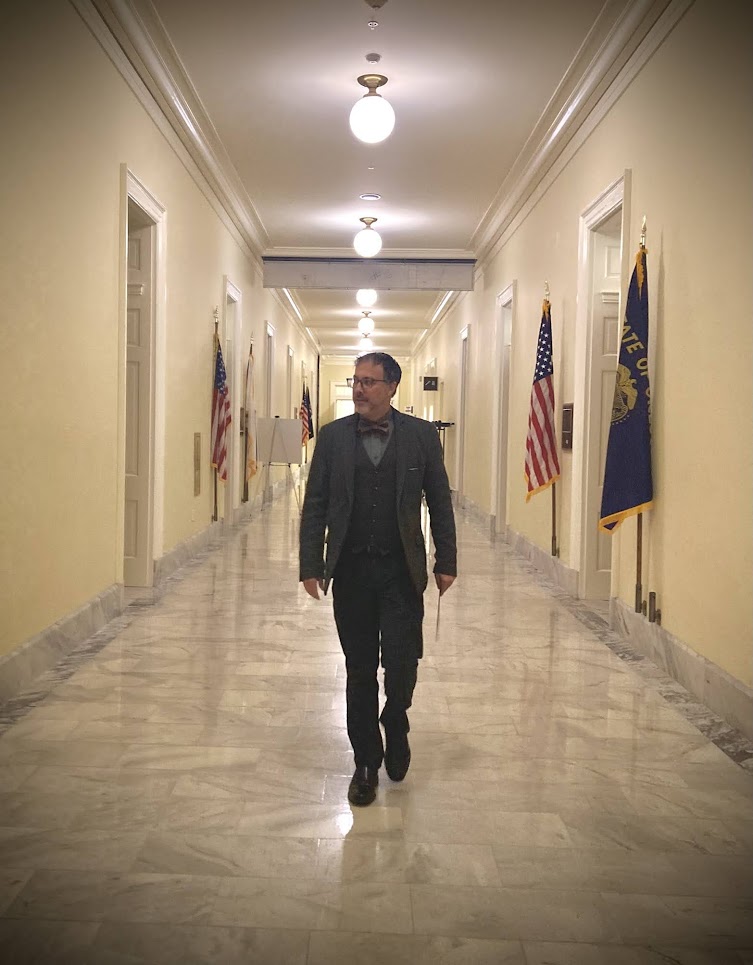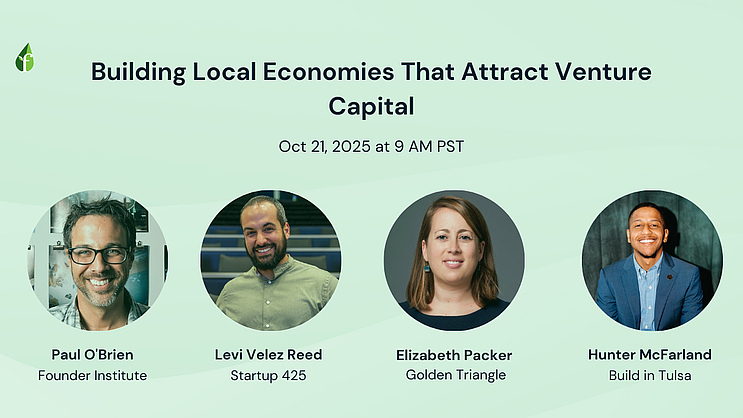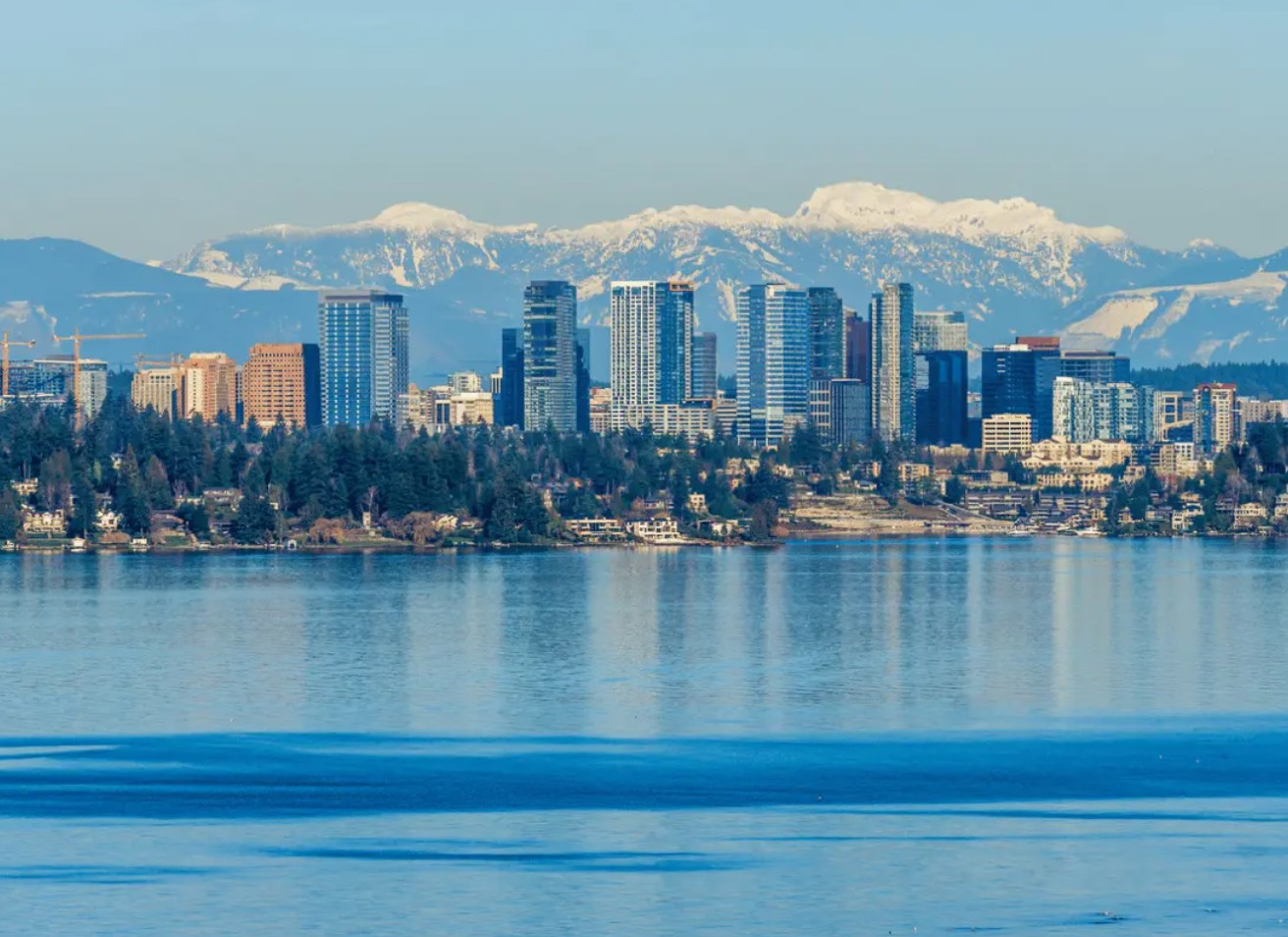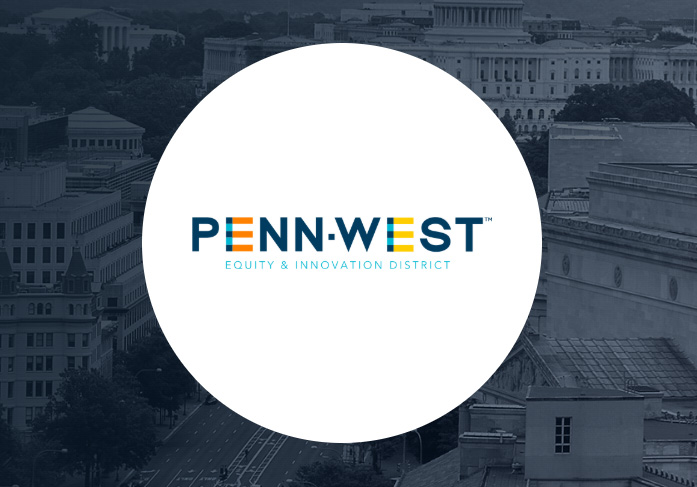
A coalition reimagines the role of cities, universities, and entrepreneurs in shaping the future of downtown Washington.
Just north of the White House, where K Street bends toward Dupont Circle and the stately facades of Farragut meet the hum of D.C.’s intellectual life, something quietly revolutionary is taking shape. The Penn West Innovation District isn’t a campus or a cluster, it’s a coalition. A deliberately designed ecosystem of public and private institutions reengineering how cities invest in the people who build their futures.
At a glance, it’s geography. But in practice, Penn West is a framework: an intersection of government, business, research, and startup infrastructure that transforms policy into prosperity.
The Ground Beneath Innovation
Washington, D.C. has always been a hub of invention, though not necessarily of gadgets or apps. Its greatest innovations were civic, institutional, and intellectual.
The city itself was the first great startup of the republic: conceived by Pierre L’Enfant as a planned capital built on ideals rather than inheritance, funded by private investors who wagered that democracy itself could be a real estate bet worth making.
The corridor that now defines the Penn West Innovation District, stretching north from Pennsylvania Avenue through Farragut and Dupont Circle, has, for over a century, been where America’s ideas became industries.
In the early 1900s, Alexander Graham Bell operated his Volta Laboratory just west of here, pioneering sound recording and speech transmission while founding the National Geographic Society, a nonprofit born from scientific curiosity that became a global communications empire. A few blocks away, the Bureau of Standards (now NIST) developed the metrology that enabled the industrial revolution to scale; proof that Washington’s earliest inventions weren’t consumer products, but the systems that made modern commerce possible.
By mid-century, Dupont Circle had evolved into a haven for writers, architects, and policy reformers. The Brookings Institution and Carnegie Endowment for International Peace established offices nearby, advancing the research-to-policy pipeline long before “innovation ecosystems” became buzzwords. IBM and AT&T used D.C. as a testbed for early computing contracts with the federal government, while George Washington University spun off early biomedical and space research tied to NASA and the Department of Defense.
Culturally, the neighborhood’s avant-garde pulse shaped its entrepreneurial DNA. In the 1970s, Dupont Circle was the epicenter of D.C.’s LGBTQ+ and artistic communities; creative subcultures that defied convention and fueled a spirit of inclusive experimentation. The 9:30 Club and Black Cat music venues, though slightly east, drew the same thinkers who now gather in co-working labs and social impact incubators. The connection isn’t incidental: creativity and dissent are the twin engines of innovation.
By the time the internet era arrived, D.C. had already given the world a playbook for civic technology. AOL, founded in nearby Northern Virginia, drew its earliest leadership and policy talent from within these blocks. The World Bank’s open data initiatives, launched in the 2000s, positioned the capital as the global prototype for transparency tech. And when startups began building at the intersection of regulation and AI, it was no accident that companies like FiscalNote, Virtru, and Quorum emerged from here, the capital of governance becoming the capital of GovTech.
Now, the same corridor that once incubated scientific societies and policy think tanks is being deliberately reengineered for a new age. Farragut and Dupont Circle, long the homes of embassies, nonprofits, and advocacy groups, are transforming again; this time into a living laboratory for sustainable, equitable entrepreneurship.
Here, proximity means opportunity when we find ourselves in an era of innovation where Public Affairs means as much or more than Marketing. Within a few blocks, you can find a global development bank, a startup accelerator, a law clinic, a café full of coders, and a federal agency debating AI governance. The density isn’t accidental, it’s design.
From Golden Triangle to Innovation Corridor
The Golden Triangle Business Improvement District (BID), which spans 44 square blocks from Dupont Circle to the White House, has spent nearly three decades preparing for this moment. Formed in 1997 to enhance the economic vitality and culture of the area, the BID has grown from its early focus on clean, safe streets into one of the most forward-thinking urban organizations in the country.
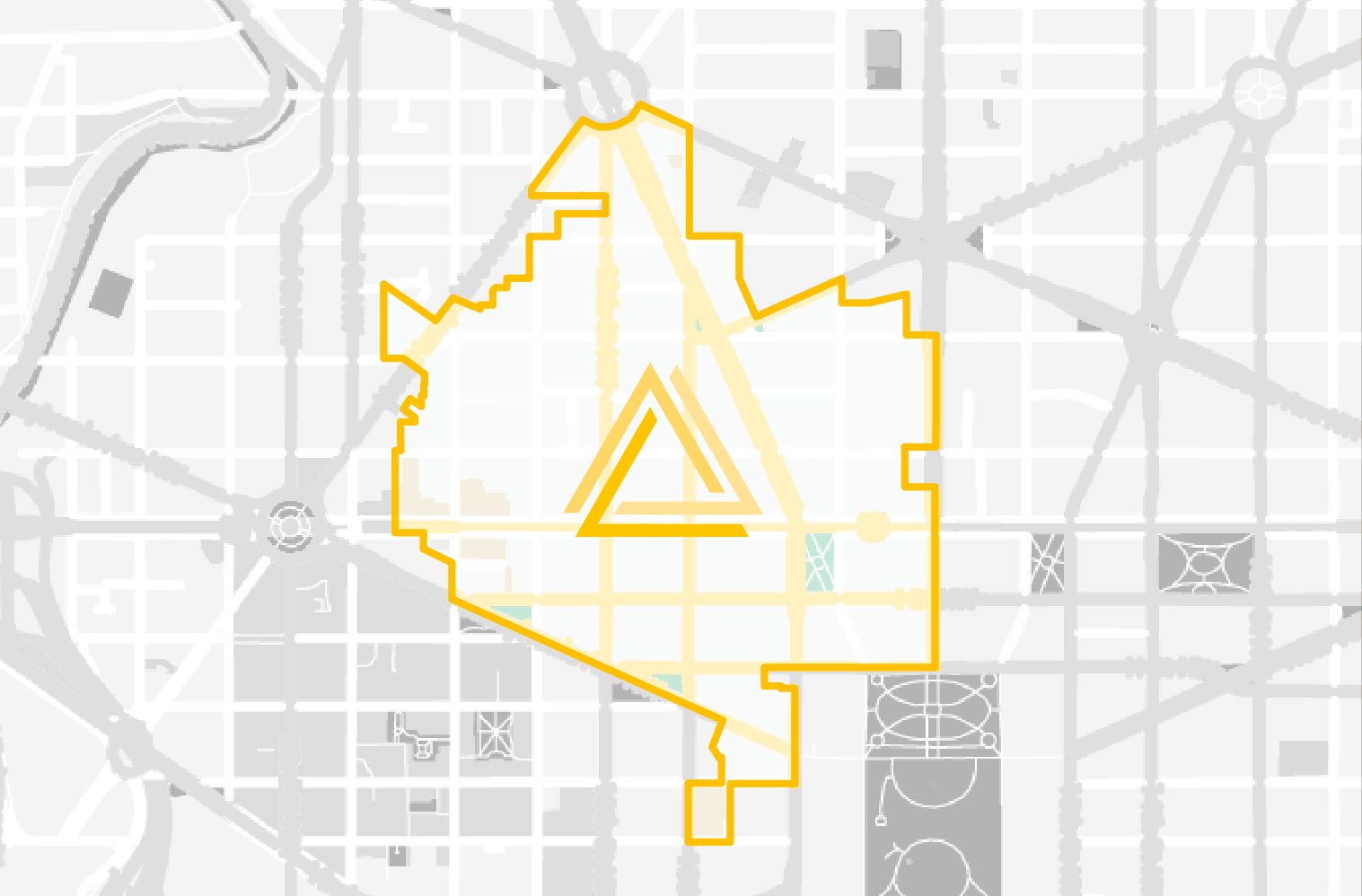
With an operating budget exceeding $7.8 million for FY2025, Golden Triangle now manages programs in safety, sustainability, and placemaking; earning LEED Platinum certification from the U.S. Green Building Council in both 2019 and 2024, the first BID in the world to achieve that distinction.
Its evolution mirrors the trajectory of urban innovation itself. What began as maintenance became transformation: public art, pop-up green spaces, festivals, and digital infrastructure. Through its 2022 strategic plan, the BID shifted its focus toward building a “world-class, innovative, mixed-use neighborhood.” In that vision, the seeds of Penn West were already being sown.
Penn West, with its proximity to federal and international institutions, walkable streets, ample amenities, beautiful public spaces, multiple universities, and available office stock, is primed for continued growth as a hub for D.C’s tech ecosystem," shared Golden Triangle Business Improvement District’s Elizabeth Packer. "The neighborhood serves as a global gateway, providing the ideal location for those working on big ideas at the intersection of policy, technology, and social impact.
A New Kind of Public-Private Partnership
In 2023, the Office of the Deputy Mayor for Planning and Economic Development (DMPED) catalyzed a $2 million grant to formally launch the Penn West Innovation District. Its mandate: to make Washington, D.C. a global destination where digital technology, public policy, equity, and social impact converge.
The collaboration unites city government with George Washington University, Golden Triangle BID, the Washington DC Economic Partnership, and a constellation of startups and international organizations. Together, they form a civic innovation engine that leverages proximity to the White House, the World Bank, and major embassies to tackle global challenges from a local platform.
At its core, Penn West is not a startup park, it’s a civic operating system. Each partner contributes a distinct role:
-
DMPED anchors the initiative with funding and policy alignment, ensuring the district’s innovations advance inclusive growth.
-
Golden Triangle BID manages placemaking, safety, and the physical fabric of innovation—maintaining streets, parks, and culture as infrastructure.
-
George Washington University (GW) contributes academic R&D, talent, and commercialization power, with over $200 million annually in research and 250 spinouts since 2010. Ranked among the world’s top 25 universities for unicorn founders, GW serves as Penn West’s intellectual and entrepreneurial anchor.
-
The Washington DC Economic Partnership (WDCEP) drives business attraction and retention, connecting companies to real estate, workforce, and market intelligence.
-
BuildWithin, a Penn West-based workforce development startup led by Ximena Hartsock Gates, provides modern apprenticeships that link D.C. residents to meaningful employment in tech and innovation fields.
This synergy gives Penn West a unique DNA, policy-driven innovation married to pragmatic entrepreneurship.
Founder Institute and the Startup Engine
“DC just got a brand-new FREE accelerator program! It’s brought to you by Founder Institute, the Golden Triangle District, and Office of the Deputy Mayor for Planning and Economic Development (DMPED), and it starts very soon,” shared Andrey Mikhalchuk, founder of Craftus. “This is a unique in-person program that helps seed-stage founders launch, scale their businesses, and raise funding. Participants get co-working space at WeWork for 14 weeks of structured programming, office hours, and working groups.”
Where universities cultivate ideas and government sets vision, Founder Institute supplies a mechanism of startup creation. As part of the Penn West coalition, FI brings its structured methodology and a platform of delivery and connection, refined across 200 cities worldwide, to help local founders validate, test, and scale ideas.
In a city historically dominated by consultants and policy professionals, FI’s presence reframes entrepreneurship as civic problem-solving. D.C. founders don’t just build apps; they build systems. From govtech and sustainability to health, fintech, and AI ethics, Penn West startups now represent the front lines of applied innovation.
“Washington, D.C. has some of the brightest minds in the world — policy experts, researchers, and innovators who understand how systems work and how change happens. What we’re doing with Founder Institute is giving that raw intellectual and civic power a structured path to launch and scale startup ventures,” noted Guc Ozenci, Program director for Penn West “Structured founder development is critical because it helps translate D.C.’s unique strengths — its talent, networks, and policy insight — into ventures that execute, scale, and create real-world impact. With our mentors and global methodology, we’re helping founders create businesses that thrive and strengthen the region’s innovation economy.”
Applications are Open to Join Penn West in Person, Here
The Ecosystem as a Living Network
The Penn West ecosystem already includes a growing roster of private-sector innovators such as Enquire AI, Mpower, Meridiam, Synergos, Opexus Technologies,, and Virtru. These companies represent the connective tissue between civic mission and market execution, proof that the district’s blend of purpose and profit attracts top-tier talent and investment.
More than that is the Penn West Global Soft Landing Program which provides companies with a flexible, discounted real estate solution. Program participants will land at by Tishman Speyer, a premium coworking space, and a streamlined process to easily access and expedite your entry into Washington, DC and build your network.
The neighborhood’s geography also amplifies its advantage. Within walking distance are seven university satellite campuses, major federal agencies, and global finance institutions. It’s a rare ecosystem where an entrepreneur can ideate a new regulatory technology in the morning and brief policymakers by afternoon.
Capital at the Core: Venture and Startup Finance in Penn West’s Orbit
For all the vision, infrastructure, and institutional firepower in Washington, no innovation district can thrive without capital. The good news is that the capital is here, it just looks different from the coastal archetype of Sand Hill Road or SoHo. In D.C., money follows mission. Investors back what matters: climate tech, government modernization, healthcare, education, and impact finance.
The Farragut-Dupont corridor, anchored by Penn West, is now surrounded by some of the region’s most active venture and early-stage investment firms.
Among them:
-
Revolution – Steve Case’s flagship fund and creator of Rise of the Rest, headquartered just blocks away, long championing regional innovation across America.
-
In-Q-Tel – The intelligence community’s strategic investment arm, funding dual-use technologies in cybersecurity, AI, and advanced analytics, often seeded by founders from GW or Georgetown.
-
Paladin Capital Group – A global cybersecurity and resilience investor managing over $1 billion, based in Dupont Circle, with deep government and defense alignment.
-
Ardent Venture Partners – Focused on fintech, digital health, and enterprise SaaS, maintaining close ties with local accelerators.
-
SineWave Ventures – A D.C.-based fund investing at the intersection of public and private sector tech adoption, often co-investing with strategic federal partners.
-
NextGen Venture Partners – An innovative model leveraging a distributed network of 1,500+ venture partners nationwide, many rooted in the region’s professional ecosystem.
-
1776 Ventures – Evolved from the historic 1776 accelerator, continuing to back mission-driven founders solving civic and regulatory challenges.
-
Village Capital – Operating from D.C. since 2009, the firm is a global pioneer in democratizing entrepreneurship, with early bets on companies focused on financial inclusion and sustainable agriculture.
-
Halcyon Ventures – The investment arm of the Halcyon Incubator, providing fellowships and capital to social entrepreneurs based throughout the DMV.
Together, these funds don’t just write checks, they anchor a philosophy. They prove that the Washington region’s comparative advantage lies in policy-driven capital: venture investment informed by regulatory insight and global perspective.
Founder Institute’s D.C. chapter serves as the connective tissue between those financiers and first-time founders, transforming early concepts into fundable ventures. Many of its Washington, D.C. graduates, such as Instant Teams, Breachbits and Sworkit, doing well, now tap local microfunds and angels such as Blu Venture Investors, D.C. ArchAngels, and K Street Capital, creating a continuous pipeline from idea to investment.
In this ecosystem, Penn West doesn’t compete with venture capital, it curates it. It connects talent from George Washington University, workforce graduates from BuildWithin, and research spinouts with the investors best equipped to understand the policy landscape in which they’ll operate.
That’s the secret of D.C.’s startup capital: it’s not speculative, it’s strategic. It invests not only in what will scale but in what will last.
Applying a Startup Economic Development Framework Overall
I’ve walked the halls and streets of this, the city that governs so much, and every time I find myself here, my brain can’t help but fire every neuron working to figure out how to make it meaningful to entrepreneurs. We can look to practical questions of the economic development of startups to nail down why Penn West, and what more we can do together:
-
Infrastructure
Strength: Penn West benefits from world-class infrastructure, fiber connectivity, LEED-certified facilities, and multi-modal transport. The Golden Triangle’s public realm management creates an environment that is both efficient and inspiring.
Gap: Affordable housing and late-stage commercial space remain limited, constraining growth. -
Network
Strength: Few districts in the world offer closer proximity between policymakers, global institutions, and innovators. The collaboration between GW, DMPED, and Founder Institute creates connective density.
Gap: Broader cross-sector integration with venture capital networks beyond are still developing. -
Talent
Strength: GW’s academic programs, seven nearby universities, and workforce initiatives like BuildWithin provide a sustainable talent pipeline.
Gap: Converting transient student populations into long-term founders remains a challenge. -
Capital
Strength: Public investment and philanthropic funding are strong, with growing interest from mission-aligned investors.
Gap: Traditional VC presence lags compared to coastal hubs; more local early-stage capital is needed. -
Culture
Strength: The district’s civic heritage fosters a unique brand of socially responsible innovation.
Gap: A more visible startup storytelling and media ecosystem could help the narrative reach national investors. -
Policy
Strength: D.C.’s proximity to federal and global institutions makes it a natural testing ground for policy-tech and regulatory innovation.Gap: Bureaucratic timelines can still slow experimentation, highlighting the importance of agile public-private models like Penn West.
Together, these factors position Penn West as a replicable framework for how cities can reimagine entrepreneurship, not as competition with Silicon Valley, but as its complement: a hub for civic innovation and policy-driven ventures.
The Future of Innovation in the Capital
The transformation of the Farragut corridor isn’t accidental, it’s architectural, cultural, and economic all at once. As hybrid work redefines downtowns across America, Washington is pioneering a new answer: innovation districts that serve not just as office space, but as living ecosystems.
 What sets Penn West apart is its moral architecture. It doesn’t celebrate entrepreneurship for its own sake, but as a vehicle for equity, sustainability, and shared prosperity. The partnerships forged here, between universities, startups, policymakers, and community leaders, demonstrate what’s possible when cities stop competing for companies and start cultivating ecosystems.
What sets Penn West apart is its moral architecture. It doesn’t celebrate entrepreneurship for its own sake, but as a vehicle for equity, sustainability, and shared prosperity. The partnerships forged here, between universities, startups, policymakers, and community leaders, demonstrate what’s possible when cities stop competing for companies and start cultivating ecosystems.
It is, fittingly, the kind of vision only a capital city could realize: a blueprint for how the next generation of innovation can serve not just markets, but democracy itself.
Beyond Washington? Join us
How might you replicate this? We’re hosting an event on October 21, 2025, Building Local Economies That Attract Venture Capital - How to Turn Your Local Economy Into Real Growth (click here to register to attend the free discussion); to bring city leaders to the table to not just learn about Penn West but how public-private partnerships and coalitions are the most meaningful solution for founders. Everyone is welcome when we'll be joined by Elizabeth Packer, as well as Hunter Mc Farland, Investor Relations Manager @ Build in Tulsa, and Levi Velez Reed of Startup425 in Bellevue, in west coast Washington.
The lesson here and which we’ll explore is that for the greatest of risk takers, both entrepreneurs and venture investors, collaboration is most meaningful.

